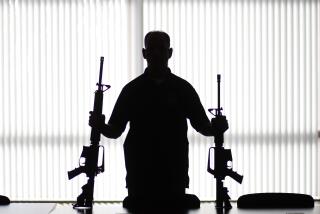DVD Group Seeks Reversal of Ruling on Decoding Tool
- Share via
San Francisco computer programmer Andrew Bunner was spreading trade secrets -- not exercising free-speech rights -- when he posted a program that decrypts DVDs on a Web site, a DVD industry group told California’s highest court Thursday.
The DVD Copy Control Assn. Inc., which licenses encryption software for the movie, computer and consumer-electronics industries, is seeking reversal of an appeals court ruling that said Bunner’s posting was protected by the 1st Amendment.
“He posted so others could take advantage of the functional methodology to steal trade secrets, not to communicate ideas,” Robert Sugarman, an attorney for the DVD Copy Control Assn., told the California Supreme Court at a hearing in San Francisco.
The suit against Bunner is among hundreds the entertainment industry has brought to stop the program’s spread.
Movie companies lose more than $3 billion in annual sales to piracy, according to the association.
Consumers, meanwhile, will spend as much as $15.4 billion on digital video discs this year.
Bunner republished a program written by a Norwegian teenager called DeCSS that decrypts DVDs. His attorneys argued that the trial court in San Jose, which barred Bunner from posting the program, improperly used California’s Uniform Trade Secrets Act to stifle his free-speech rights.
“Trade secret by nature is a limited right,” said Bunner’s attorney, David Greene, adding that DeCSS had been available on the Internet for three months before the DVD Copy Control Assn. sued. “Those rights disappear once it becomes public.”
Justice Kathryn Werdegar questioned whether the court needs to protect trade secrets, once the information has been released to the public.
“If the material at issue here is no longer considered a trade secret, would that dispel the need for prior restraint?” Werdegar asked. A court exercises prior restraint when it intervenes to prevent material from being published.
Sugarman said that reasoning poses a danger to the protection of trade secrets.
“An infringer could quickly post a trade secret and say there’s no need for an injunction because it’s already out there,” Sugarman said.
California Atty. Gen. Bill Lockyer, who filed court documents in support of the DVD Copy Control Assn., told the court that using the Internet to disseminate information was like using “the loudest megaphone on the planet.”
“The program DeCSS is a burglary tool,” Lockyer said, citing an industry claim that 350,000 movies are illegally downloaded each day.
The entertainment industry has had success stopping the spread of DeCSS by suing individuals under the 1998 Digital Millennium Copyright Act, which bans the creation of software that allows users to open digital works protected by copyright. In 2001, an appeals court in New York upheld a ban on DeCSS.
In California, the DVD Copy Control Assn. sued hundreds of people, including Bunner.
The judges hearing Bunner’s case Thursday questioned whether a computer program is a form of pure speech.
Greene said the appeals court correctly characterized DeCSS as pure speech that was part of a lively debate in academic and technology circles.
“This program was available for download on CNet,” Greene said, referring to a popular Web site.
More to Read
The biggest entertainment stories
Get our big stories about Hollywood, film, television, music, arts, culture and more right in your inbox as soon as they publish.
You may occasionally receive promotional content from the Los Angeles Times.










